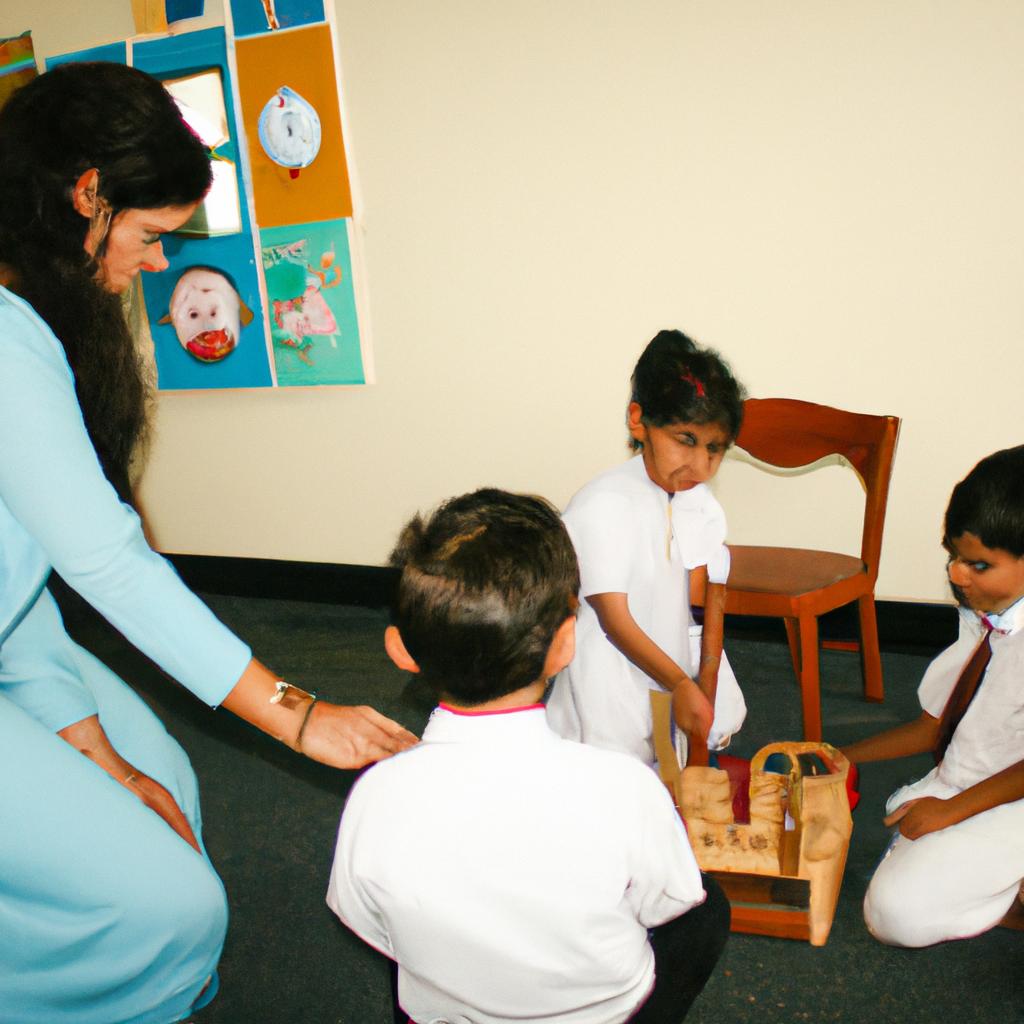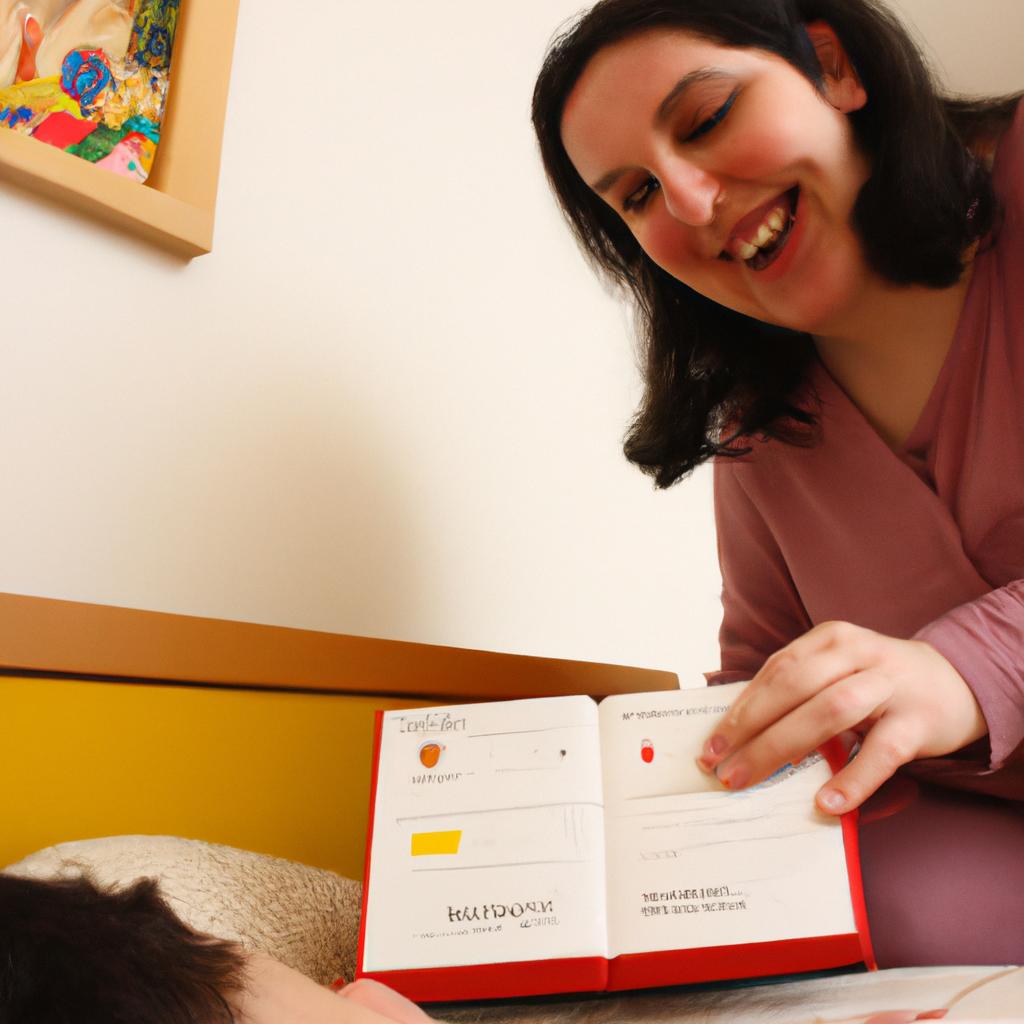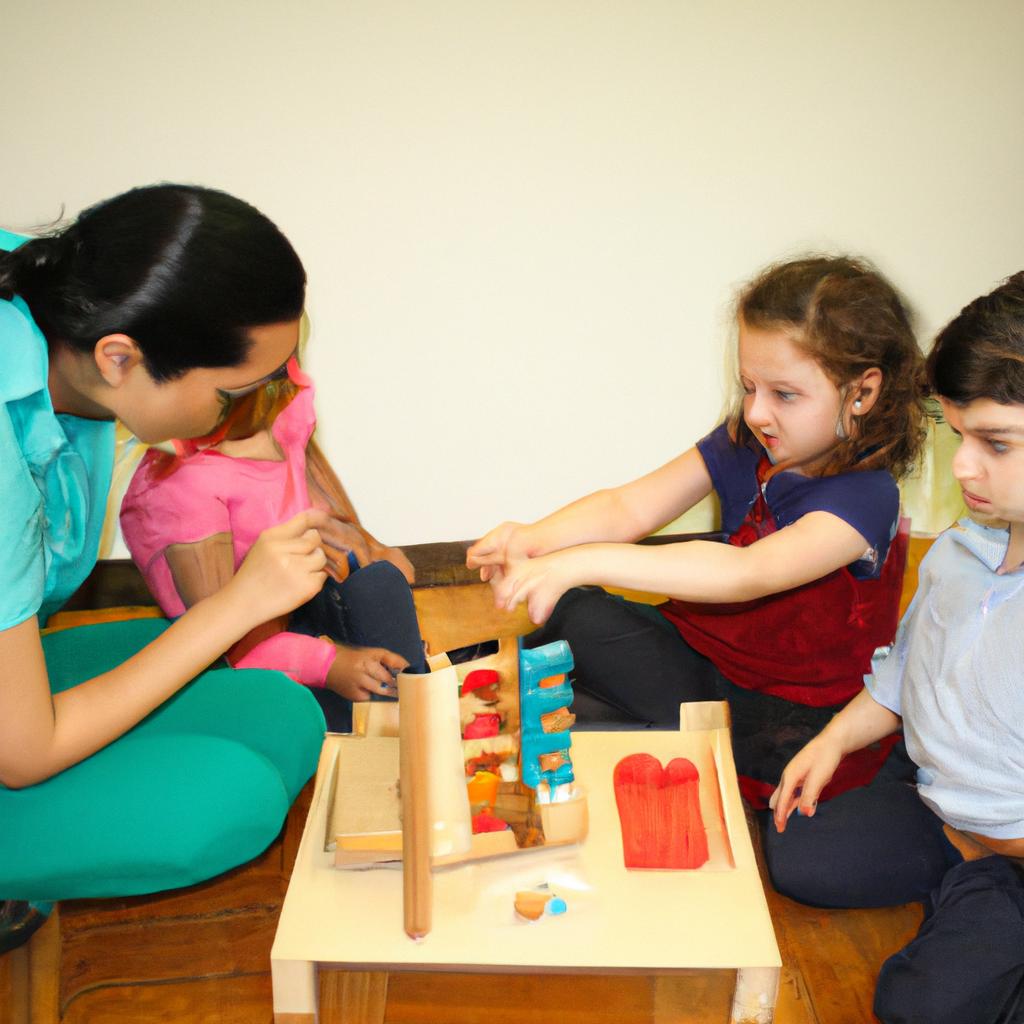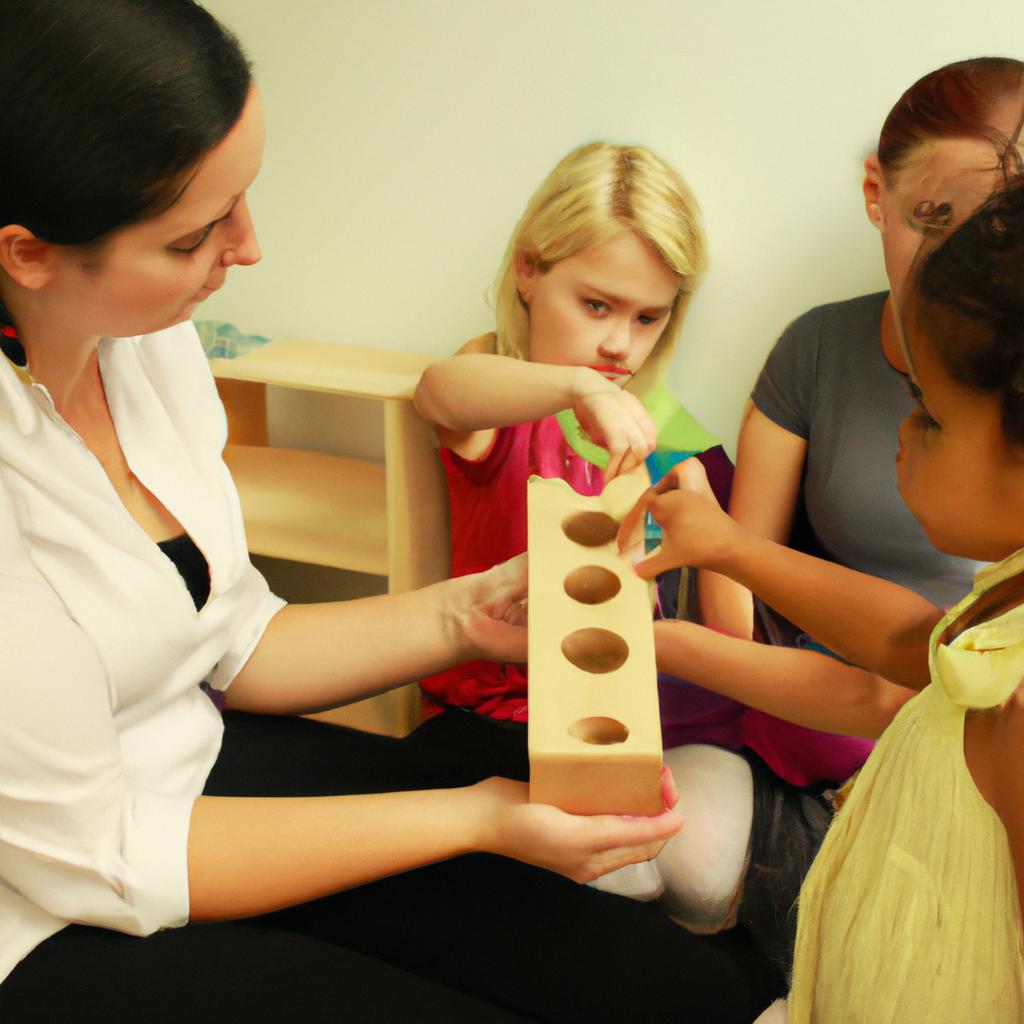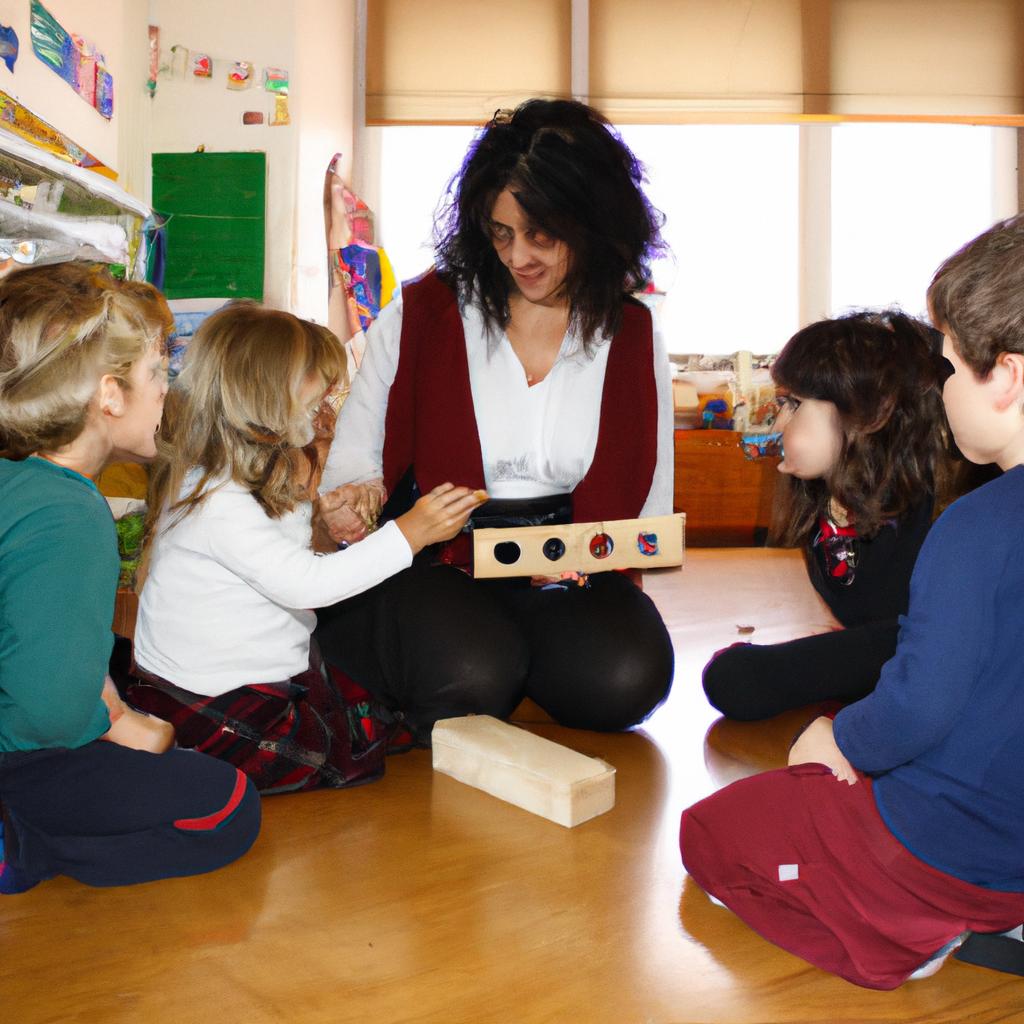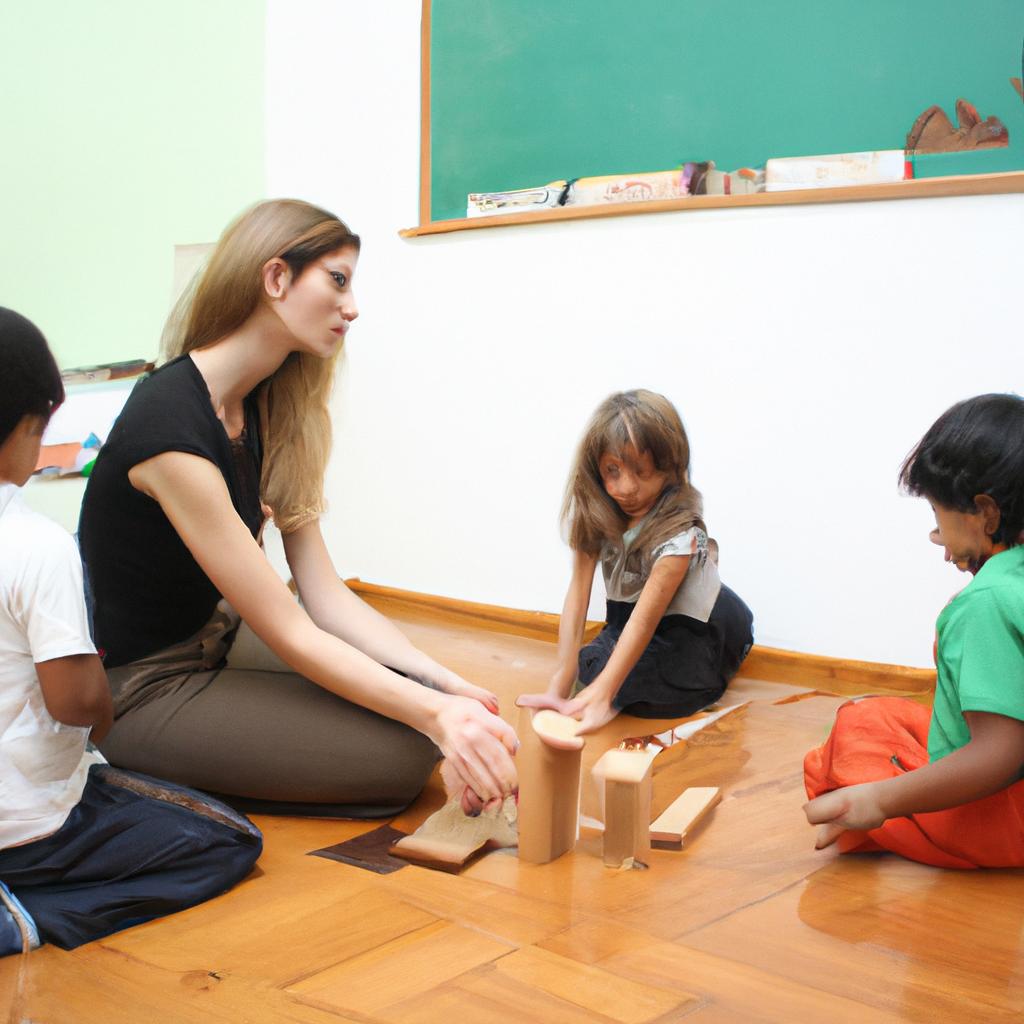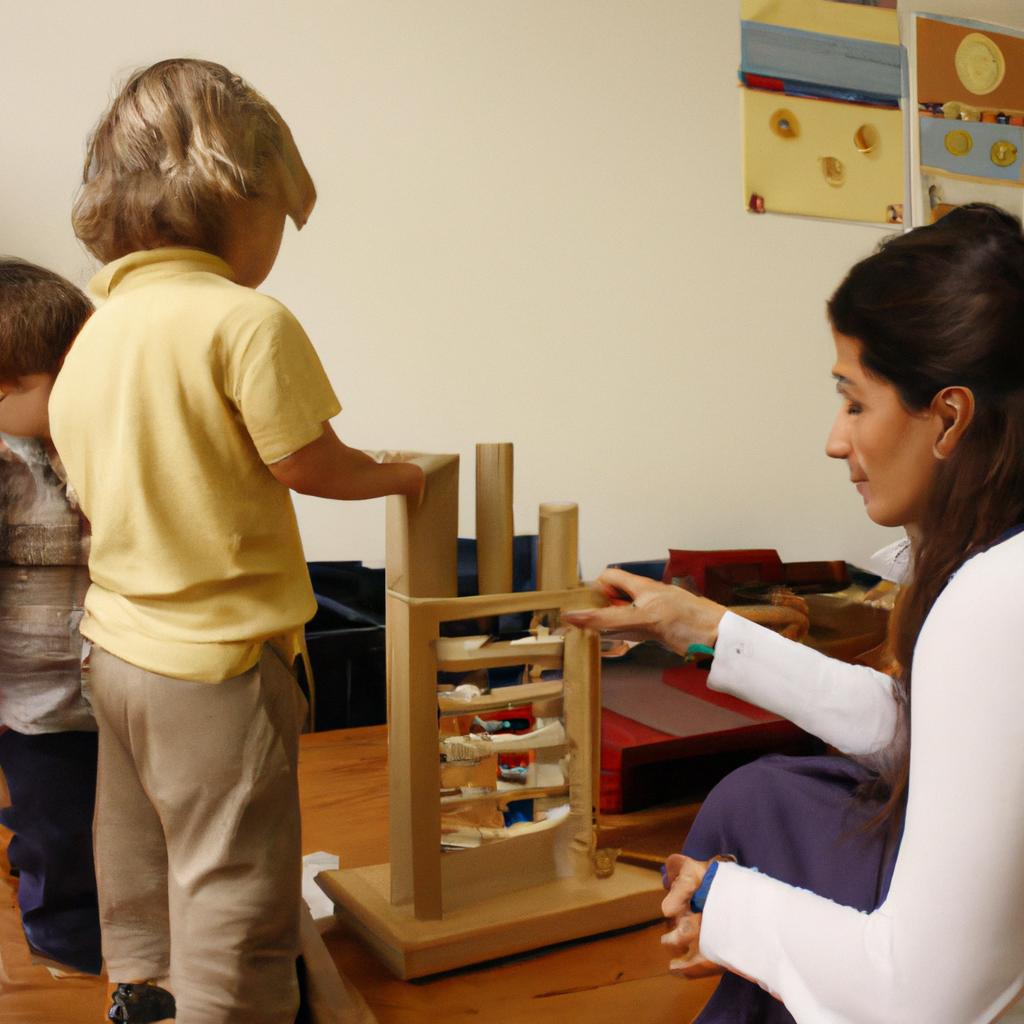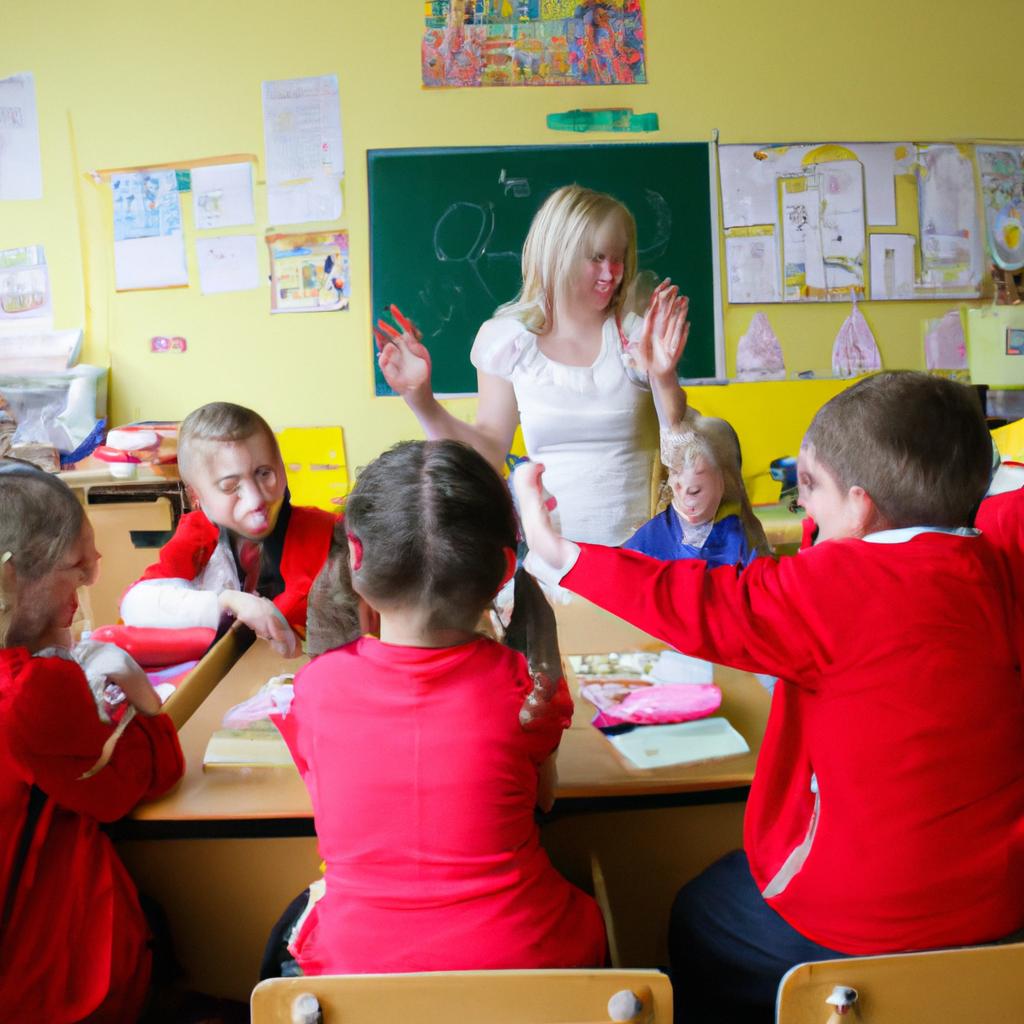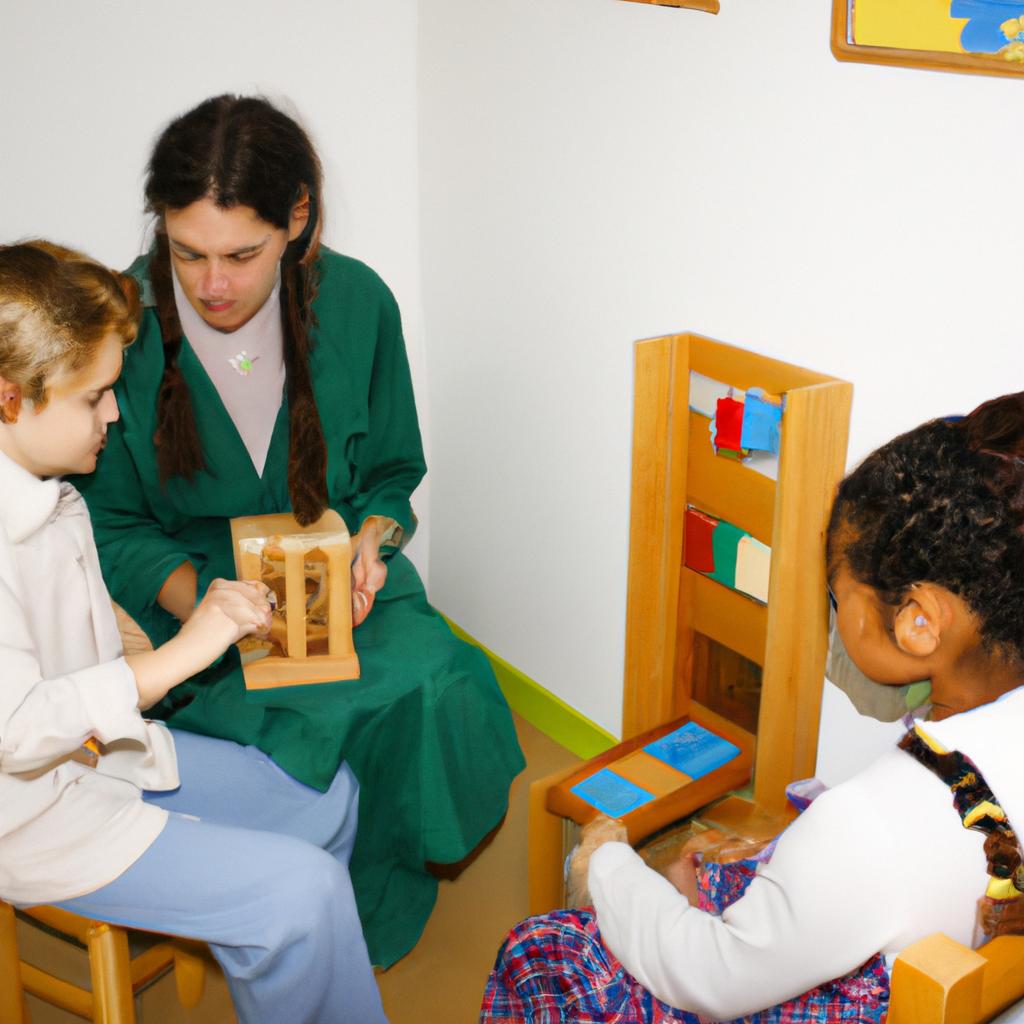The Montessori education approach is widely recognized for its emphasis on promoting holistic development in young children. By providing a nurturing and inclusive learning environment, Montessori schools aim to foster the intellectual, social, emotional, and physical growth of each child. For instance, let us consider the case study of Emily, a four-year-old enrolled in a Montessori school. Through hands-on activities and individualized instruction tailored to her unique needs and interests, Emily not only develops academic skills but also cultivates independence, self-discipline, and problem-solving abilities.
In recent years, there has been an increasing interest in understanding the benefits of Montessori education and how it contributes to the overall development of children. This article aims to explore the various ways in which Montessori schools promote holistic development by examining key components such as prepared environments, mixed-age classrooms, student-centered learning approaches, and teacher-student interactions. Additionally, this article will delve into research studies that have investigated the long-term effects of Montessori education on cognitive abilities, social-emotional skills, creativity, and academic achievement. By uncovering these benefits, we can gain insights into why many parents choose Montessori schools for their children’s early educational experiences.
Understanding the Montessori Approach
Imagine a classroom where children are given the freedom to choose their activities, work at their own pace, and explore subjects that capture their interest. This is what Maria Montessori envisioned when she developed her educational approach nearly a century ago. The Montessori method emphasizes individualized learning, independence, and holistic development. By understanding this unique approach, we can uncover the benefits it offers to students.
At its core, the Montessori approach recognizes that each child has an innate desire for knowledge and self-development. It fosters an environment where children actively participate in their education and take ownership of their learning journey. In traditional classrooms, teachers often dictate what should be learned and how it should be taught. However, in a Montessori setting, educators act as facilitators who guide and support children’s exploration.
One key feature of the Montessori method is the use of specially designed materials that promote hands-on learning experiences. These materials encourage sensory engagement and enable students to grasp abstract concepts through concrete manipulation. For instance, imagine a young learner exploring geometric shapes by fitting them into corresponding holes on a wooden board or using sandpaper letters to trace out words—these activities engage multiple senses while enhancing cognitive skills.
To further illustrate the impact of the Montessori approach on student development, consider these emotional responses:
- A sense of autonomy: Children gain confidence as they learn to make decisions independently within set boundaries.
- Increased motivation: When children have control over what they learn and when they learn it, they become more motivated to explore new areas of knowledge.
- Enhanced problem-solving abilities: Through independent exploration and trial-and-error experiences, children develop critical thinking skills necessary for solving complex problems.
- Improved self-esteem: The emphasis on personalized progress rather than comparisons with peers cultivates a positive self-image among Montessori learners.
Additionally, let us examine how this approach addresses different aspects of child development:
| Physical Development | Cognitive Development | Socio-Emotional Development |
|---|---|---|
| Fine motor skills | Logical thinking | Empathy and cooperation |
| Gross motor skills | Problem-solving | Emotional regulation |
| Coordination | Concentration | Communication |
By nurturing these various dimensions, the Montessori approach aims to cultivate well-rounded individuals who are prepared for both academic success and personal growth.
Transitioning into the subsequent section about “Fostering Independence and Self-Directed Learning,” we can further explore how the Montessori method instills a sense of autonomy in students.
Fostering Independence and Self-Directed Learning
In a Montessori classroom, children are encouraged to take charge of their own learning and development. This approach fosters independence and self-directed learning, allowing students to grow holistically in various aspects of life. One example that illustrates the benefits of this approach is Emily, a four-year-old student who attends a Montessori school.
Emily’s journey at the Montessori school began with her expressing an interest in painting. In a traditional classroom setting, she may have been given specific instructions on how to paint or even told what colors to use. However, in her Montessori classroom, Emily was provided with art materials and allowed complete freedom to explore her creativity. With minimal intervention from her teacher, she was able to experiment with different techniques and express herself through vibrant colors. This experience not only enhanced her artistic skills but also nurtured her sense of autonomy and decision-making.
There are several key aspects within the Montessori approach that contribute to its effectiveness in promoting holistic development:
-
Child-centered environment: A Montessori classroom is carefully designed to provide children with opportunities for exploration and independent learning. The materials available cater to various developmental needs and interests, allowing each child to engage in activities that align with their unique abilities.
-
Mixed-age classrooms: Unlike traditional schools where students are grouped solely based on age, Montessori classrooms typically consist of mixed-age groups. This arrangement promotes collaboration among peers as older children can mentor younger ones while reinforcing their own knowledge by teaching others.
-
Individualized instruction: Teachers in a Montessori school observe each child closely and tailor their instruction accordingly. By recognizing individual strengths and areas for improvement, educators can create personalized learning experiences that foster growth across multiple domains.
-
Respect for natural development: The Montessori philosophy acknowledges that children progress through distinct stages of development at their own pace. Rather than imposing predetermined benchmarks or timelines, the approach values each child’s unique journey and provides them with the necessary support to thrive.
Through these principles, Montessori education empowers children like Emily to become self-motivated learners who take responsibility for their own development. By nurturing independence, critical thinking skills, and a love for learning, this approach lays a strong foundation for future academic success and personal growth.
Transition into subsequent section: Developing a Love for Learning is an essential aspect of fostering holistic development in Montessori education.
Developing a Love for Learning
Building upon the foundation of fostering independence and self-directed learning, Montessori education also focuses on developing a love for learning in students. By cultivating curiosity and intrinsic motivation, this approach creates an environment where children actively engage with their educational journey.
One example that exemplifies the development of a love for learning in Montessori schools is the case study of Emily, a five-year-old student. Initially hesitant to participate in class activities, Emily gradually began showing enthusiasm and eagerness as she explored various subjects through hands-on experiences. Through her engagement with materials like the Pink Tower and the Sandpaper Letters, Emily developed a genuine passion for discovering new concepts, fueling her desire to learn more.
To further understand how Montessori education cultivates a love for learning, consider the following emotional responses elicited by its key principles:
- Encourages curiosity: The emphasis on child-led exploration nurtures natural curiosity, inspiring excitement about acquiring knowledge.
- Promotes autonomy: Allowing students to choose their activities fosters a sense of ownership over their own learning journey.
- Fosters creativity: The freedom to explore diverse pathways encourages imaginative thinking and problem-solving skills.
- Cultivates perseverance: Engaging in long-term projects teaches students resilience and determination when faced with challenges.
| Principle | Emotional Response |
|---|---|
| Encourages Curiosity | Excitement |
| Promotes Autonomy | Ownership |
| Fosters Creativity | Imagination |
| Cultivates Perseverance | Resilience |
In conclusion,
Montessori education empowers children to become active participants in their own learning process, instilling within them a deep appreciation for knowledge acquisition. By promoting curiosity, autonomy, creativity, and perseverance among students like Emily, this educational approach lays the groundwork for lifelong learners who are eager to explore the world around them.
Nurturing Social and Emotional Skills
Building upon the foundation of developing a love for learning, Montessori education also emphasizes the importance of nurturing social and emotional skills in children. By creating an environment that promotes holistic development, students are provided with opportunities to cultivate essential life skills that extend beyond academic achievement.
One example of how Montessori schools foster social and emotional growth is through multi-age classrooms. In these settings, older children serve as mentors to younger ones, fostering a sense of responsibility and empathy. For instance, imagine a scenario where a 5-year-old student struggles with tying their shoelaces. In a traditional classroom setting, they may feel embarrassed or inadequate. However, in a Montessori classroom, an older peer could offer assistance in a patient and supportive manner. This not only cultivates positive social interactions but also enhances the younger child’s self-confidence and motivation to learn new skills.
To further understand the benefits of Montessori education on social and emotional development, consider the following aspects:
- Self-regulation: Through practical life activities that require concentration and focus (such as pouring liquids or sorting objects), children develop self-control and patience.
- Conflict resolution: The emphasis on open communication encourages students to express their feelings constructively while learning problem-solving techniques.
- Empathy: Regular engagement in collaborative projects enables children to appreciate different perspectives and develop understanding towards others’ emotions.
- Responsibility: Opportunities for independent decision-making within the framework of classroom guidelines instill accountability and autonomy.
Table – Benefits of Nurturing Social and Emotional Skills in Montessori Education:
| Aspect | Description |
|---|---|
| Better interpersonal relationships | Enhances ability to form meaningful connections with peers |
| Improved self-esteem | Encourages confidence in one’s abilities |
| Enhanced resilience | Equips individuals with coping strategies during challenging situations |
| Greater overall well-being | Contributes to a positive mental and emotional state |
In summary, Montessori education’s focus on social and emotional skills not only enriches the school experience but also equips children with crucial life skills necessary for their future success. By fostering self-regulation, conflict resolution abilities, empathy, and responsibility, students are prepared to navigate various interpersonal situations in a healthy manner.
Moving forward to enhancing cognitive and academic abilities…
Enhancing Cognitive and Academic Abilities
Transitioning from the previous section, where social and emotional skills were highlighted as essential aspects of Montessori education, we now delve into how this educational approach also fosters cognitive and academic development. To illustrate this further, let us consider a hypothetical case study:
Imagine a young child named Emily who enters a Montessori classroom at the age of three. In this environment, she is encouraged to explore various hands-on materials that promote learning through sensory experiences. For instance, she may engage with colorful counting beads to develop her mathematical understanding or manipulate letters made of sandpaper to learn phonics. These activities not only enhance her cognitive abilities but also ignite her curiosity and love for learning.
The benefits of Montessori education in enhancing cognitive and academic abilities can be summarized as follows:
-
Individualized Learning: The Montessori method emphasizes personalized instruction tailored to each student’s needs and interests. This individualized approach allows children like Emily to progress at their own pace, ensuring they grasp concepts thoroughly before moving on to more advanced topics.
-
Focus on Practical Life Skills: Alongside traditional academics, Montessori schools emphasize the acquisition of practical life skills such as self-care routines, organization, problem-solving, and decision-making. By integrating these skills into daily activities, students develop critical thinking abilities that extend beyond the classroom.
-
Multi-Sensory Approach: Montessori classrooms integrate different senses by incorporating tactile materials, visual aids, auditory exercises, and movement-based activities. Engaging multiple senses simultaneously enhances memory retention and deepens understanding across various subjects.
-
Foster Independence: With an emphasis on independence within guided boundaries, Montessori education empowers children to take ownership of their learning journey. Students are given freedom to choose tasks based on their interests while developing concentration skills necessary for focused academic pursuits.
To better visualize the impact of Montessori education on cognitive development, consider the following table:
| Cognitive and Academic Abilities | Traditional Education Approach | Montessori Education Approach |
|---|---|---|
| Critical Thinking Skills | Emphasized to a limited extent | Cultivated through hands-on exploration and problem-solving activities |
| Self-Regulation | Less focus on self-regulatory skills development | Encouraged through independence, choice-making, and goal-setting opportunities |
| Collaborative Learning | Primarily teacher-led instruction | Promoted through peer interaction, sharing materials, and cooperative projects |
| Creativity | Often confined within structured assignments | Nurtured by encouraging imaginative play, open-ended tasks, and artistic expression |
In summary, Montessori education promotes cognitive and academic abilities by tailoring instruction to individual needs, incorporating practical life skills into daily routines, utilizing multi-sensory approaches to enhance learning experiences, and fostering independence. Such an approach not only prepares children like Emily for academic success but also nurtures their natural curiosity and love for lifelong learning.
Transitioning seamlessly into the subsequent section about “Creating a Supportive and Inclusive Learning Environment,” we explore how Montessori schools prioritize building a community where every child feels valued and included.
Creating a Supportive and Inclusive Learning Environment
Building upon the cognitive and academic benefits of Montessori education, a supportive and inclusive learning environment further complements the holistic development of children. By fostering collaboration, empathy, and self-expression, Montessori schools create an atmosphere that nurtures not only academic growth but also emotional intelligence.
Case Study: For instance, imagine a three-year-old child named Sarah who attends a Montessori school. In this nurturing environment, Sarah is encouraged to explore her interests freely while being supported by trained educators who guide her learning journey. This approach allows Sarah to develop critical thinking skills as she engages in hands-on activities such as sorting objects or solving puzzles, thus enhancing her problem-solving abilities.
Emotional Response Bullet Point List (Markdown format):
- Increased sense of belonging
- Enhanced social-emotional development
- Improved communication skills
- Boosted self-confidence
Table (3 columns x 4 rows) – Emotional Development Milestones:
| Age Range | Emotional Milestone | Example |
|---|---|---|
| 1-2 years | Developing trust | A toddler seeking comfort from their caregiver |
| 3-5 years | Demonstrating empathy | Offering help to a classmate in need |
| 6-8 years | Understanding emotions | Recognizing different feelings in themselves |
| 9-12 years | Cultivating resilience | Bouncing back after facing challenges |
In conclusion, Montessori education not only enhances cognitive and academic abilities but also creates a supportive and inclusive learning environment where children can thrive emotionally. Through collaborative projects, empathetic interactions with peers, and opportunities for self-expression, students benefit from enhanced social-emotional development. The emotional milestones achieved at each age range further emphasize the positive impact of Montessori education on holistic child development.

